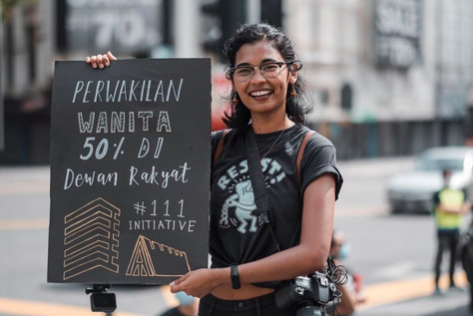I am Generation Equality 2020: Realizing Women's Rights | By Jane Law
Malaysia has definitely come a long way when it comes to fighting for women’s rights. However, the day isn’t exactly all bright and sunny, especially when we come across indecorous reports time after time such as politicians commenting on female sports’ attires being ‘too revealing’, proposing protection laws for men that were ‘seduced’ into raping and well, you know all the jazz.
 |
| Illustration by Darlyn @chokoilatte |
 |
| Tan Heang-Lee | Credits: Women's Aid Organization |
Women’s Aid Organization (WAO) is Malaysia’s leading women’s rights advocacy organization and service provider for women and children who face abuse. Founded in 1982 by a group of visionary women, WAO provides free crisis support and shelter to survivors of abuse, reaching over 3,000 women and children each year. WAO has been the first to establish a domestic shelter in Malaysia.
 |
| Credits: Women's Aid Organization |
Over the past 38 years, WAO has been at the forefront of efforts to advance women’s rights in Malaysia. As we look to the future, we continue to evolve and innovate, while staying true to our mission: ending violence against women and realizing gender equality. Learning from women and children’s experiences, WAO hopes to improve public policies and shift societal attitudes on violence against women and gender equality.
Many of the rights that women have today — the right to vote, the right to education, the right to work, etc. — were the result of years, if not decades, of women’s rights activism — locally and globally. They are hard-won rights. Reforms such as protection against discrimination in the workplace, the Gender Equality Act and many others have the potential to improve the lives of millions of women in Malaysia. We still have a long way to go in ensuring that all women can fully exercise and enjoy their rights. So, we need to keep pushing for progress.
 |
| Credits: Women's Aid Organization |
I do think that many women in Malaysia are speaking up and refusing to be silenced. For example, we saw hundreds of women in Malaysia taking to the streets on 8 March 2020, calling for reforms related to women’s rights. Many have also spoken up against sexual harassment and demanded for the Sexual Harassment Act. Over the past 10 years, we have also seen an overall increase in the number of domestic violence cases reported to the police, which suggests that more and more women are breaking the silence.
Firstly, we need a Sexual Harassment Act. About 28% of Malaysians surveyed have experienced sexual harassment, according to a 2019 YouGov survey. Many victims, however, cannot get redress, as existing laws are simply inadequate. Therefore, proposing the Sexual Harassment Act would introduce a specialized Sexual Harassment Tribunal, which would allow victims to seek redress without going through a lengthy, costly process.
 |
| Credits: @mubin.photography |
 |
| Credits: Women's Aid Organization |
 |
| Credits: @mubin.photography |
Last year, WAO published an extensive report on the status of women’s human rights in Malaysia. You can check it out here. Additionally, to learn more about the rights of survivors of domestic violence and sexual assault, check out our website.
 |
| Credits: Women's Aid Organization |
You could volunteer with us by filling out our volunteer form. Some of the activities that our volunteers are involved in include public education events, advocacy campaigns, programs for women and children. Together, we can work to create a world where all genders are treated as equals.






0 comments